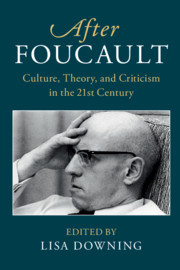Book contents
3 - Foucault's History of Neoliberalism
from PART I - GOING AFTER FOUCAULT
Published online by Cambridge University Press: 30 May 2018
Summary
In the wake of the recent financial crisis (2007–), there has been renewed interest in thinking critically about the pro-market form of governance known as neoliberalism. Foucault's 1978–9 lectures at the Collège de France – translated into English under the title The Birth of Biopolitics – have been central to this task. For, in spite of their title, these lectures have no explicit connection to the study of biopolitics, but instead map the emergence of different national trajectories of neoliberal reason from the mid-twentieth century onwards. These lectures are one of Foucault's few historical excursions into the twentieth century and are also remarkable because of their timing: Foucault delivered them at the point that neoliberalism was being rolled out as a concrete governmental form in the United Kingdom and United States, and they were published in English at the height of the financial crisis in 2008. For these reasons, these lectures have attracted a mass readership, and have led many to return to Foucault's work in order to think historically and critically about the neoliberal present.
The reception of these lectures, however, has not always been positive, as some have questioned the motives behind Foucault's interest in neoliberalism and with this the political commitments, more generally, of his later work. Readers of these lectures have fallen into two main camps: those, on the one hand, who treat them as a valuable resource for understanding the historical basis and complexities of neoliberal reason, and those, on the other, who think Foucault devoted a series of lectures to the study of neoliberalism because he was attracted to many of the ideas in question. These lectures have, as a consequence, become a contested site for thinking about Foucault's political commitments and legacy, and for considering, more generally, the grounds upon which it is possible to engage critically with the neoliberal project.
This chapter argues that while Foucault's biopolitics lectures are of value for analysing the formation and operation of neoliberal reason, nonetheless they should be read critically as, among other things, they provide a partial history of neoliberalism that contains many gaps and inaccuracies. It is important to remember that these lectures are just that: lectures that were written up on a weekly basis and never intended for publication in their present form.
- Type
- Chapter
- Information
- After FoucaultCulture, Theory, and Criticism in the 21st Century, pp. 46 - 60Publisher: Cambridge University PressPrint publication year: 2018
- 2
- Cited by

